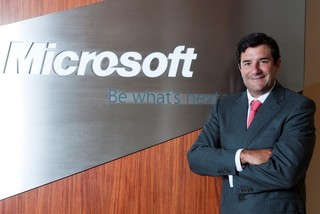Motorola Promises Internet Browsing on Entire Mobile Phone Range.
Published:
21 March 1999 y., Sunday
Motorola has promised to include Internet browsing capabilities on all its mobile phones in the year 2000. The statement came on the opening day of the CeBIT exhibition and coincided with Motorola_s introduction of a new range of personal communication products. Frank Lloyd, president of Motorola_s Personal Communications Sector for Europe, Middle East and Africa, said that Motorola_s whole range of digital phones would be Wireless Application Protocol (WAP) compliant as soon as the interoperability standards for the protocol have been agreed. "This means that consumers can expect to see the first Internet-browsing capabilities appearing on a Motorola GSM phone by the end of the year, and across our entire digital phone range in 2000," he said. Motorola is joining with Ericsson and Nokia in a joint marketing initiative aimed at making the mobile Internet easier to promote. It is being called Mobile Media Mode, and will use a universal icon that identifies mobile devices and Internet content that are designed to work together. Mobile phones will not, of course, be able to display all the advanced layouts that are now seen on the World Wide Web. The announcement follows others earlier this year which indicated the trend. Motorola announced a $50 million contract with Cellnet on February 9 to deliver GPRS (General Packet Radio Service) capability across its GSM network. This facilitates applications such as Internet-browsing and mobile e-commerce. Also in February, Motorola announced a $1 billion alliance with Cisco Systems to create an open wireless, digital communications infrastructure, based on the Internet protocol. At this week_s CeBIT, Motorola showed its latest products, which included the smallest and lightest dual-band GSM mobile phone and the world_s first tri-band GSM phone.
Copying, publishing, announcing any information from the News.lt portal without written permission of News.lt editorial office is prohibited.
The most popular articles
Software company announced new structure_ of it_s business.
more »
 The electronic vignette system in the Slovak Republic has become unique in the world thanks to the speed of implementation and increase in the revenues from the collection carried out by SkyToll a.s. on behalf of the Slovak government.
more »
The electronic vignette system in the Slovak Republic has become unique in the world thanks to the speed of implementation and increase in the revenues from the collection carried out by SkyToll a.s. on behalf of the Slovak government.
more »
 Unisys has promoted Perla Do Amral to a key leadership role, becoming director of service desk operations for the U.S.-based IT company’s managed services centers in Latin America.
more »
Unisys has promoted Perla Do Amral to a key leadership role, becoming director of service desk operations for the U.S.-based IT company’s managed services centers in Latin America.
more »
 Cesar Cernuda is a Microsoft veteran of 19 years, and has served in several senior leadership positions for Microsoft Business Solutions, including overseeing Microsoft’s ERP and CRM business worldwide.
more »
Cesar Cernuda is a Microsoft veteran of 19 years, and has served in several senior leadership positions for Microsoft Business Solutions, including overseeing Microsoft’s ERP and CRM business worldwide.
more »
 Unisys received a contract from NASA Langley Research Center (LaRC) to continue to deliver advanced hardware, software, and systems integration for flight simulation projects at the agency.
more »
Unisys received a contract from NASA Langley Research Center (LaRC) to continue to deliver advanced hardware, software, and systems integration for flight simulation projects at the agency.
more »
 Unisys Corporation reported third quarter 2015 results.
more »
Unisys Corporation reported third quarter 2015 results.
more »
 On the 10th–15th, this September, RAI Exhibition and Congress Centre in Amsterdam will hold the 48th international exhibition-conference dedicated to electronic media and entertainment industry IBC 2015.
more »
On the 10th–15th, this September, RAI Exhibition and Congress Centre in Amsterdam will hold the 48th international exhibition-conference dedicated to electronic media and entertainment industry IBC 2015.
more »
 Unisys Corporation announced the completion of the initial phase of testing of a facial recognition system at Dulles International Airport, Virginia, to help Customs and Border Protection (CBP) to identify imposters attempting to enter the United States using passports that are fraudulent or do not belong to them.
more »
Unisys Corporation announced the completion of the initial phase of testing of a facial recognition system at Dulles International Airport, Virginia, to help Customs and Border Protection (CBP) to identify imposters attempting to enter the United States using passports that are fraudulent or do not belong to them.
more »
 Television was invented back in 1884, when German Paul Gottlieb Nipkow came up with the idea to scan images using a rotating metal disc with a spiral pattern of holes in it. When the disc was spinning, each hole would scan one brightly lit line of the image.
more »
Television was invented back in 1884, when German Paul Gottlieb Nipkow came up with the idea to scan images using a rotating metal disc with a spiral pattern of holes in it. When the disc was spinning, each hole would scan one brightly lit line of the image.
more »
 SuperCom, a leading provider of secure solutions for e-Government, Public Safety, HealthCare, and Finance sectors, announced its results for the quarter ended March 31, 2015.
more »
SuperCom, a leading provider of secure solutions for e-Government, Public Safety, HealthCare, and Finance sectors, announced its results for the quarter ended March 31, 2015.
more »
 Unisys Corporation today announced that Tom Patterson has joined the company as vice president for global security solutions, responsible for leading Unisys' security solutions business worldwide.
more »
Unisys Corporation today announced that Tom Patterson has joined the company as vice president for global security solutions, responsible for leading Unisys' security solutions business worldwide.
more »